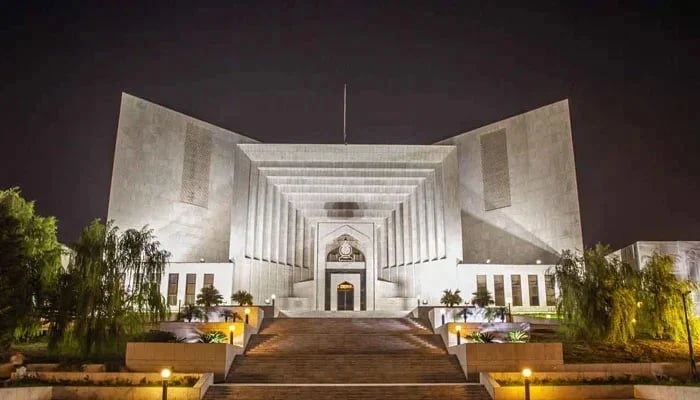Army Act applies to civilians damaging, stealing military property: counsel
Justice Rizvi says any arrested individual must be presented before relevant magistrate
ISLAMABAD: Khawaja Haris, the Ministry of Defence's attorney, during Monday's Supreme Court proceedings said the Army Act will be applied if a civilian steals military property or damages a military installation.
Haris stated this, continuing his argument in the case challenging civilian trials in military courts.
A seven-member constitutional bench, headed by Justice Aminuddin Khan, is hearing the case. Other members of the bench include justices Jamal Khan Mandokhail, Musarrat Hilali, Muhammad Ali Mazhar, Hasan Azhar Rizvi, Naeem Akhtar Afghan, and Shahid Bilal.
Haris argued that under the Pakistan Army Act, armed forces are empowered to arrest civilians involved in crimes such as attacking military installations or stealing military property.
However, Mazhar remarked that an FIR is a legal prerequisite for any arrest. Justice Rizvi added that any arrested individual must be presented before the relevant magistrate.
Justice Mandokhail questioned the procedural aspects of such cases: “How is the case registered? Who investigates it? What is the process? We want to understand.”
He further said that a person only becomes an accused under Section 2(d) of the Army Act once they have been indicted. Haris countered that the Constitution itself grants a distinct jurisdiction for court martial proceedings and cited previous rulings, including those by former chief justice Saeed-uz-Zaman Siddiqui, to reinforce his argument.
The defence counsel added that there were numerous court judgements regarding court martials.
Haris further stated that it was up to lawmakers to decide where a trial should take place.
However, Justice Mandokhail said the court’s role is to assess if the trial is constitutional.
He further emphasised that it is not for the judiciary to consider whether a verdict would reduce or increase terrorism: “Controlling terrorism is the parliament’s job, not the court’s.”
The defence counsel also maintained that military courts do not fall under Article 175 of the Constitution, prompting Justice Mandokhail to ask under which constitutional provision they operate.
The hearing on the appeals against the annulment of civilian trials in military courts was adjourned until Tuesday (tomorrow), with Khawaja Harris scheduled to continue his rebuttal.
-
Security forces gun down 30 terrorists in multiple IBOs in KP: ISPR
-
MQM-P calls for new province in Sindh
-
US report validates Pakistan military edge over India: PM
-
Banned TTP poses serious threat to Pakistan security: UNSC panel
-
CM Afridi clarifies remarks on by-poll after ECP requests army deployment
-
Dubai sees 3.2m Pakistani passengers in 2025 as airport sets new milestone
-
Security forces kill 23 Indian proxy terrorists in KP's Kurram
-
Pakistan to construct island to boost oil exploration: report












